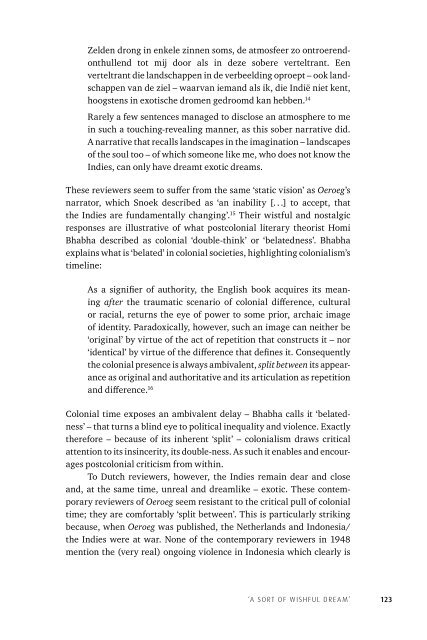Discord Consensus
7aze300jFJo
7aze300jFJo
Create successful ePaper yourself
Turn your PDF publications into a flip-book with our unique Google optimized e-Paper software.
Zelden drong in enkele zinnen soms, de atmosfeer zo ontroerend-<br />
onthullend tot mij door als in deze sobere verteltrant. Een<br />
verteltrant die landschappen in de verbeelding oproept – ook landschappen<br />
van de ziel –waarvan iemand als ik, die Indië niet kent,<br />
hoogstens in exotische dromen gedroomd kan hebben. 14<br />
Rarely a few sentences managed to disclose an atmosphere to me<br />
in such a touching-revealing manner, as this sober narrative did.<br />
A narrative that recalls landscapes in the imagination –landscapes<br />
of the soul too –of which someone like me, who does not know the<br />
Indies, can only have dreamt exotic dreams.<br />
These reviewers seem to suffer from the same ‘static vision’ as Oeroeg’s<br />
narrator, which Snoek described as ‘an inability [. . .] to accept, that<br />
the Indies are fundamentally changing’. 15 Their wistful and nostalgic<br />
responses are illustrative of what postcolonial literary theorist Homi<br />
Bhabha described as colonial ‘double-think’ or ‘belatedness’. Bhabha<br />
explains what is ‘belated’ in colonial societies, highlighting colonialism’s<br />
timeline:<br />
As a signifier of authority, the English book acquires its meaning<br />
after the traumatic scenario of colonial difference, cultural<br />
or racial, returns the eye of power to some prior, archaic image<br />
of identity. Paradoxically, however, such an image can neither be<br />
‘original’ by virtue of the act of repetition that constructs it –nor<br />
‘identical’ by virtue of the difference that defines it. Consequently<br />
the colonial presence is always ambivalent, split between its appearance<br />
as original and authoritative and its articulation as repetition<br />
and difference. 16<br />
Colonial time exposes an ambivalent delay –Bhabha calls it ‘belatedness’<br />
– that turns a blind eye to political inequality and violence. Exactly<br />
therefore –because of its inherent ‘split’ –colonialism draws critical<br />
attention to its insincerity, its double-ness. As such it enables and encourages<br />
postcolonial criticism from within.<br />
To Dutch reviewers, however, the Indies remain dear and close<br />
and, at the same time, unreal and dreamlike –exotic. These contemporary<br />
reviewers of Oeroeg seem resistant to the critical pull of colonial<br />
time; they are comfortably ‘split between’. This is particularly striking<br />
because, when Oeroeg was published, the Netherlands and Indonesia/<br />
the Indies were at war. None of the contemporary reviewers in 1948<br />
mention the (very real) ongoing violence in Indonesia which clearly is<br />
‘A sort of wishful dream’ 123


